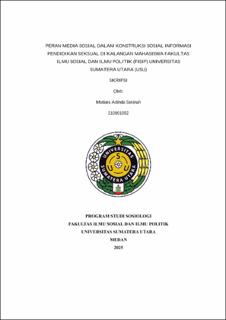| dc.description.abstract | The phenomenon of sexual education, still considered taboo to discuss openly
within the family, has been addressed by the presence of social media as a source of
information that provides broader and more interactive access to knowledge, including
sexual education for students. Platforms such as Instagram, TikTok, YouTube, and X are
frequently used by students to obtain information related to this topic. Sexual education
content presented through social media contributes to shaping new understandings
among students through a process of social construction of information that includes the
stages of externalization, objectivation, and internalization, as proposed by Peter L.
Berger and Thomas Luckmann (1991). Students interpret sexual education not only as
information about sex or reproduction but also as broader social learning, such as
building self-esteem, combating stigma, and preventing sexual violence and sexually
transmitted diseases. This study aims to analyze the role of social media in the social
construction of sexual education information among students of the Faculty of Social and
Political Sciences, University of North Sumatra (USU). This study used a descriptive
qualitative method with data collection techniques in the form of in-depth interviews and
documentation. Data were obtained from interviews with 10 students of the Faculty of
Social and Political Sciences, University of North Sumatra who actively accessed sexual
education content through social media. The results show that the social construction of
sexual education information among students of the Faculty of Social and Political
Sciences, University of North Sumatra, is formed through active interaction with social
media content in three stages of Berger and Luckmann's dialectic, and impacts cognitive
changes, the formation of new norms, and the expansion of meaning regarding sexual
issues. | en_US |


